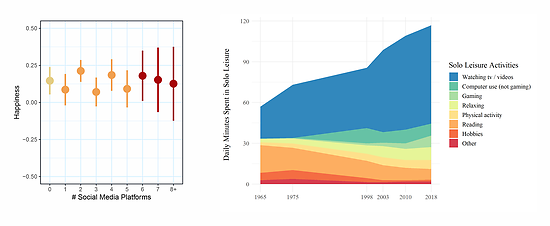Laboratory
Population Dynamics and Sustainable Well-Being
At a Glance
Projects
Publications
Team
Project
Technology Use and Its Effects on Time-Use Patterns, Social Relationships, and Well-Being
Robert Gordon Rinderknecht, Sophie Lohmann, Daniela Veronica Negraia, Emilio Zagheni
The use of Internet, smartphones, and social networking sites represent a major social discontinuity in recent history. We study how the digitalization of life differentially affects social relations, emotional well-being, and the way we spend our time, across demographic groups. Detailed Description
Leisure time spent alone with technology has increased, but there is no association between how many social media platforms we use and how happy we are

(A) Means and 95% confidence intervals of self-rated happiness (1 = very happy, 0 = pretty happy, -1 = not too happy) by how many social media platforms respondents used (data: General Social Survey, 2016). (B) Figure shows average daily minutes spent in solitary leisure between 1965 and 2018, broken down by type of leisure activity (data: American Heritage Time Use Study (AHTUS)). © MPIDR
Publications
Kashyap, R.; Rinderknecht, R. G.; Akbaritabar, A.; Alburez-Gutierrez, D.; Gil-Clavel, B. S.; Grow, A.; Kim, J.; Leasure, D. R.; Lohmann, S.; Negraia, D. V.; Perrotta, D.; Rampazzo, F.; Tsai, C.-J.; Verhagen, M. D.; Zagheni, E.; Zhao, X.:
In: Research handbook on digital sociology, 48–86. Cheltenham: Edward Elgar Publishing. (2023)
Rinderknecht, R. G.; Negraia, D. V.; Lohmann, S.; Zagheni, E.:
MPIDR Working Paper WP-2023-025. (2023)

Lohmann, S.; Zagheni, E.:
MPIDR Working Paper WP-2020-023. (2020)
